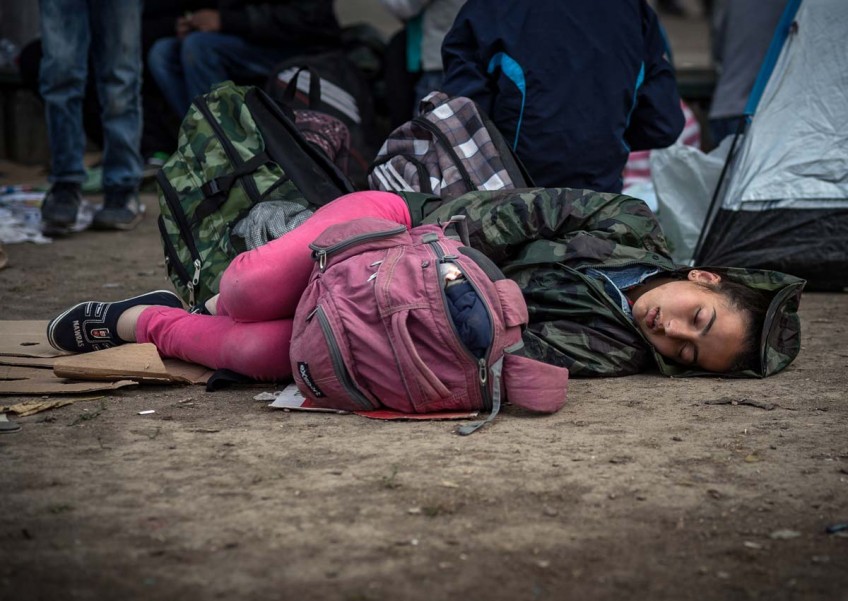Call for unified system to deal with asylum-seekers


LONDON - French President Francois Hollande and German Chancellor Angela Merkel have called for "a unified system" of dealing with asylum-seekers in the European Union as tensions rise throughout the continent over record inflows of immigrants.
Europe's migrant crisis is "an exceptional situation that will last for some time", said Mr Hollande, who joined Dr Merkel in criticising the "abhorrent" behaviour of European extremists "who spread their idiotic message of hatred" against migrants.
But although the EU will be holding, later this week, a special summit with Balkan countries on the south-eastern edge of the continent in an effort to close one of the main routes for migration, there is little prospect for a more concerted approach to the problem.
The migratory pressures facing Europe are of historic proportions. Germany alone expects to receive around 800,000 asylum applications this year, way above the 625,000 asylum-seekers registered last year throughout the EU.
And the expectation is that up to 1.2 million immigrants may make it to Europe's shores by December. This will be the biggest migration wave in Europe since the end of the Cold War in 1989, and the second-biggest since the conclusion of World War II seven decades ago.
Unlike previous immigration spikes, the current wave is not temporary. Wars in the Middle East and poverty in Africa will continue driving migration pressures for decades. Europe's only choice is, therefore, to manage rather than halt the pressure altogether.
The snag is that the continent's existing procedures are inadequate for the task, and there is no consensus for their reform.
Under current arrangements, each EU nation is responsible for processing asylum-seekers arriving on its soil.
That made sense when flows were manageable, but is now irrelevant as European nations such as Italy, Spain, Greece and Hungary, which bear the brunt of the migration inflows, are not willing to shoulder the burden. So they simply neglect registering new arrivals and encourage them to move on to other countries.
Almost all the asylum-seekers in Germany come from other EU states. Nor is this "pass-the-parcel" game unique to southern Europe.
Asylum-seekers trying to sneak through the rail tunnel connecting Britain to Europe are legally France's responsibility, but the French authorities turn a blind eye to their blatant efforts to defeat British border controls.
One option would be to scrap the EU's current arrangements and opt, instead, to treat all newly arrived immigrants as part of a European "pool", which could then be divided between the EU member-states. But this was rejected by 24 out of the EU's 28 governments, including those of the biggest nations of Britain, France and Germany.
Instead, the French and Germans are demanding that other European states take their asylum responsibilities seriously by establishing refugee camps; "Germany and France expect all member states to implement fully the right of asylum", said Chancellor Merkel.
Yet that's easier said than done for a country like Greece, which only narrowly avoided financial bankruptcy this month, but accounts for 57 per cent of all newly landed migrants and has no capacity to register and feed them.
The French and the Germans are also proposing the adoption of a new European list of "safe" countries, whose citizens would be automatically denied asylum, that is intended to speed up processing asylum applications.
But European judges will take a dim view of such a list because current EU legislation insists that each asylum application must be treated individually, on its merits.
Bereft of grand ideas, European governments resort instead to small steps.
Dr Merkel, who will attend the summit of southern European nations tomorrow, will urge them to do more to seal their borders.
And EU officials say that they are finalising a region-wide support programme on migration and border management, although the effort has only been allocated a puny €8 million (S$13 million).
Germany, the country bearing the brunt of the migration flows, remains a generous host. Millions of clothing items have been donated by the German public, and Germany's Interior Minister Thomas de Maiziere insists that his government won't be panicked.
The migration flow "is a challenge for all of us, but Germany is not overwhelmed", he says.
Still, all European politicians know that the domestic backlash against migrants is growing. Which is why a number of EU governments are now openly discussing the possibility of using the ultimate weapon at their disposal: reimposing border controls between their countries, something which they are allowed to do in emergencies.
Yet, from providing an answer to migratory pressures, that would be Europe's final admission of defeat.
jonathan.eyal@gmail.com

This article was first published on August 26, 2015.
Get a copy of The Straits Times or go to straitstimes.com for more stories.